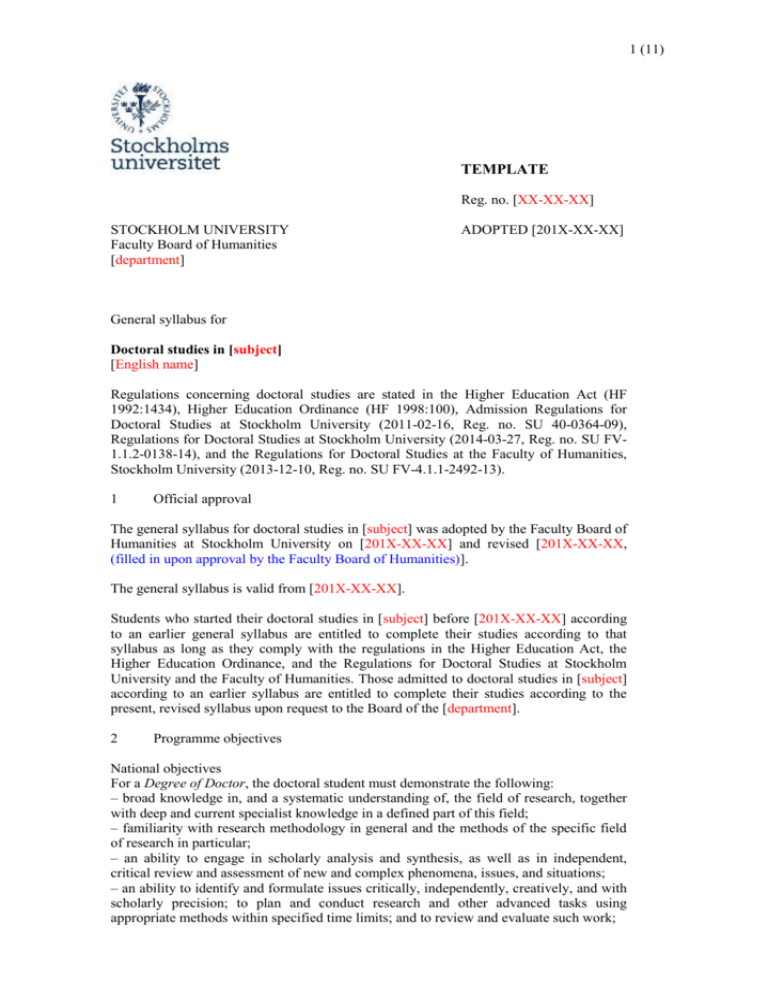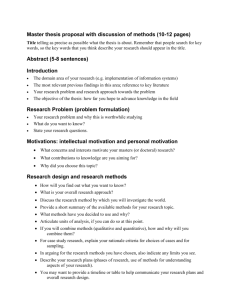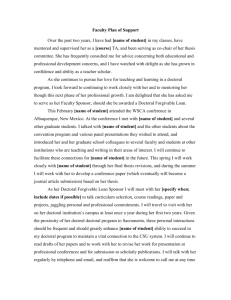1 (11) TEMPLATE Reg. no. [XX-XX
advertisement

1 (11) TEMPLATE Reg. no. [XX-XX-XX] STOCKHOLM UNIVERSITY Faculty Board of Humanities [department] ADOPTED [201X-XX-XX] General syllabus for Doctoral studies in [subject] [English name] Regulations concerning doctoral studies are stated in the Higher Education Act (HF 1992:1434), Higher Education Ordinance (HF 1998:100), Admission Regulations for Doctoral Studies at Stockholm University (2011-02-16, Reg. no. SU 40-0364-09), Regulations for Doctoral Studies at Stockholm University (2014-03-27, Reg. no. SU FV1.1.2-0138-14), and the Regulations for Doctoral Studies at the Faculty of Humanities, Stockholm University (2013-12-10, Reg. no. SU FV-4.1.1-2492-13). 1 Official approval The general syllabus for doctoral studies in [subject] was adopted by the Faculty Board of Humanities at Stockholm University on [201X-XX-XX] and revised [201X-XX-XX, (filled in upon approval by the Faculty Board of Humanities)]. The general syllabus is valid from [201X-XX-XX]. Students who started their doctoral studies in [subject] before [201X-XX-XX] according to an earlier general syllabus are entitled to complete their studies according to that syllabus as long as they comply with the regulations in the Higher Education Act, the Higher Education Ordinance, and the Regulations for Doctoral Studies at Stockholm University and the Faculty of Humanities. Those admitted to doctoral studies in [subject] according to an earlier syllabus are entitled to complete their studies according to the present, revised syllabus upon request to the Board of the [department]. 2 Programme objectives National objectives For a Degree of Doctor, the doctoral student must demonstrate the following: – broad knowledge in, and a systematic understanding of, the field of research, together with deep and current specialist knowledge in a defined part of this field; – familiarity with research methodology in general and the methods of the specific field of research in particular; – an ability to engage in scholarly analysis and synthesis, as well as in independent, critical review and assessment of new and complex phenomena, issues, and situations; – an ability to identify and formulate issues critically, independently, creatively, and with scholarly precision; to plan and conduct research and other advanced tasks using appropriate methods within specified time limits; and to review and evaluate such work; 2 (11) – an ability to make a substantial contribution to the development of knowledge through their own research in a thesis; – an ability to present and discuss research and research findings with authority, in dialogue with the scholarly community and society in general, orally and in writing, in both national and international contexts; – an ability to identify areas where further knowledge is required; – the potential to contribute to the development of society and support other people’s learning, both in the field of research and education and in other advanced professional contexts; – intellectual independence and scholarly integrity, as well as an ability to make ethical assessments relating to research; – insight into the possibilities and limitations of research, its role in society, and our responsibility for how it is used. Local objectives No local objectives. [Where applicable, list any local objectives here. Otherwise use the standard wording above.] For a Degree of Licentiate, the doctoral student must demonstrate the following: National objectives – knowledge and understanding in the field of research, including current specialist knowledge in a defined part of the field, as well as advanced knowledge of research methodology in general and the methods of the specific field of research in particular; – an ability to identify and formulate issues critically, independently, and creatively; to plan and conduct a limited research project and other advanced tasks using appropriate methods within specified time limits, thereby contributing to the production of knowledge; and to evaluate this work; – an ability to present and discuss research and research findings clearly, in dialogue with the scholarly community and society in general, orally and in writing, in both national and international contexts; – the skills required to participate independently in research and development and to work independently in other advanced contexts; – an ability to make ethical assessments in their own research; – insight into the possibilities and limitations of research, its role in society, and our responsibility for how it is used; – an ability to identify areas where further knowledge is required and to take responsibility for developing their knowledge. Local objectives No local objectives. [Where applicable, list any local objectives here. Otherwise use the standard wording above.] 3 Prerequisites and entry requirements The applicant must meet the general entry requirements as well as the specific entry requirements. In addition, the applicant must demonstrate the potential to benefit from the training. 3.1 General entry requirements In order to meet the general entry requirements for doctoral studies, the student must have completed a second-cycle degree, completed course requirements of at least 240 higher education credits, of which 60 credits must be in the second cycle, or acquired equivalent knowledge in another way in Sweden or elsewhere. 3 (11) Anyone who has met the general entry requirements for doctoral studies by 1 July 2007 will subsequently be considered to have general eligibility; however, no longer than until the end of June 2015. Under special circumstances, the Faculty Board of Humanities may grant an exemption from the general entry requirements for an individual applicant. 3.2 Specific entry requirements An applicant meets the specific entry requirements for doctoral studies in [subject] if he or she has received a passing grade on course work of at least 30 higher education credits from the second cycle in [main field of study], including a degree project of at least 15 credits. [Language requirements, if any. For example: In addition, the applicant is required to be proficient in Swedish [Norwegian, Danish] and English. This includes the ability to read, speak, and write in these languages.] The entry requirements can also be met by students who have acquired equivalent knowledge in Sweden or elsewhere. 4 Admission and selection Decisions to admit candidates to doctoral studies in [subject] are made by the Board of the [department]. The Department Board cannot delegate decisions concerning admission to another body. The Department Board may only admit candidates who will be employed as doctoral students. Decisions to admit candidates with other types of funding than doctoral studentships, or to admit candidates to licentiate studies, are made the Faculty Board of Humanities. Doctoral students who have previously undertaken studies leading to a licentiate degree and wish to pursue a doctoral degree must apply for the position during a regular application period. If accepted, they will be admitted to a programme for the time remaining for a doctoral degree. Selection from among applicants who meet the entry requirements for doctoral studies in [subject] is made with reference to their ability to benefit from the training. The selection is made by the Department Board. The selection is based on the following criteria: I. QUALIFICATIONS 1. Education in general. Assessment of the depth and breadth of the applicant’s previous education. 2. Scholarly production. On the basis of the applicant’s degree projects from the first and second cycle and, where applicable, other scholarly production, the applicant’s ability to benefit from the training is assessed according to the following criteria: Critical ability Analytical skills Creativity Independence 4 (11) The assessment should also consider the aspect of time, that is, to what extent the applicant has demonstrated the ability to complete previous academic projects within specified time limits. In addition, based on a comparison of the academic works, an assessment is made of the applicant’s academic development. II. RESEARCH PLAN In connection with the application, the applicant must describe his/her proposed field of research in a research plan. The research plan should contain one or more research problems and an outline of the research project. The research plan is assessed on the basis of: Relevance Originality Potential for completion within the specified time limits (i.e. a period equivalent to four years of full-time study for a doctoral degree, or two years for a licentiate degree) III. ABILITY TO COLLABORATE The applicant’s ability to collaborate is assessed on the basis of, for example, references, certificates or interviews. IV. ADDITIONAL INFORMATION [Any additional assessment criteria] When selecting and admitting applicants to third-cycle programmes in [subject], the Department Board should heed Faculty guidelines. 5 Programme content and structure (for licentiate students, see Section 8 below) 5.1 General The programme is planned to cover four academic years of full-time doctoral studies. A doctoral student may request to study part time, but no less than 50 per cent of full-time (i.e. eight years). Doctoral students are expected to devote themselves entirely to their studies and make efficient use of tuition and supervision. For part-time doctoral students, the time of study is extended in proportion to the decreased activity rate. Third-cycle programmes in [subject] comprise courses worth [XX] higher education credits, the equivalent of [X] semesters of full-time study, as well as a thesis worth [XXX] higher education credits, equivalent to [X] semesters of full-time study. [[Third-cycle programmes in [subject] are offered with the following specialisations: 1. Specialising in [specialisation] 2. [etc.]] 5.2 Individual study plans All active doctoral students in [subject] must have individual study plans, approved by the Department Board. The individual study plans should be drawn up and reviewed in accordance with Chapter 6, Section 36 of the Higher Education Ordinance, Regulations for Doctoral Studies at Stockholm University, and Faculty guidelines. 5 (11) Copies of the individual study plans and any revisions must be submitted to the Faculty Board at least once a year. 5.3 Courses The course component comprises [X] semesters of full-time study (i.e. [XX] higher education credits) and should be designed to meet the programme objectives described in Section 2 above. Obligatory courses, [XX] higher education credits: 1. [Title, credits] 2. [etc.] [alternatively: If there are no obligatory courses, the courses are described in more general terms, for example as follows: The programme does not include any obligatory courses; however, the course component should comprise at least XX credits of theory and method, as well as any additional course requirements. Other courses, [XX] higher education credits: [For other courses, it should be specified in which fields they are optional, or if there are no limitations. Any limitations should be specified.] Optional courses must be approved by the principal supervisor before they begin. The courses and forms of examination should be specified in the individual study plan. [Include any courses in teaching and learning in higher education for doctoral students.] [Also include participation in seminars. Write, for example: Over the course of the programme, the doctoral student is expected to attend higher seminars and progressively present the results of his or her ongoing research.] [[5.3.1 Third-cycle courses in [specialisation] [repeat according to 5.3 above]] 5.4 Doctoral thesis The topic of the thesis is chosen in consultation with the supervisors at the beginning of the doctoral studies. A starting point for the consultation may be the research plan that the doctoral student submitted with the application for the position. The thesis should reflect the student’s ability to complete the selected research task in a scholarly and independent manner – with or without collaboration – in order to meet the objectives described in Section 2 above. The thesis should be designed either as a unified, coherent academic work (monograph) or as a compilation of academic papers with an introductory chapter and final conclusion (compilation thesis) written by the doctoral student alone or in collaboration with somebody else. If the study is carried out as part of a collaboration, the doctoral student’s contributions must be clearly distinguishable. The study and its findings should be presented in such a way that the thesis (including the 6 (11) chapters of the compilation thesis) reaches a level of quality that is commensurable with requirements for publication in an academic series or journal of high quality. [Additional requirements for a compilation thesis may be specified here (e.g. relating to the introductory chapter, the number of articles, etc.).] Additional requirements: The thesis is the result of independent research efforts that make a substantial contribution to the development of knowledge. The aim, research problem, and scholarly methods are clearly presented and motivated. The methods are applied accurately. Previous research is presented in such a way that it is clearly separated from the doctoral student’s own contributions to the field of research. The source material is presented and described, and the way the material has been delimited is explained and motivated. Notes, references, tables, diagrams, etc., are handled with scholarly precision. The thesis is logically and consistently organised. The thesis uses appropriate language. The findings are summarised. 5.4.1 Language The doctoral thesis in [subject] should be written in [language – specify all options], [[also specify the language of any specialisations within the subject]]. A thesis written in Swedish must include a summary in English, and vice versa. A thesis written in a language other than Swedish or English must include a summary in both English and Swedish. The summary should provide enough detail that a reader without skills in the language of the thesis is able to gain a clear understanding of the aim and main content of the thesis, the methods used, and the results achieved. References should be made to the different chapters of the thesis. The principal supervisor is responsible for making sure the summary meets these requirements. In the grading process, the assessment of the summary should be part of the overall assessment of the thesis. An abstract in English, comprising no more than 2,000 characters, including spaces, should accompany the thesis. The abstract should: include the title of the thesis, the language it was written in, the name of the author/authors, and the name of the university and department; describe the content of the thesis according to the following structure: research problem, methods, and results; include key words and other information of significance to automated information systems. 7 (11) 6 Supervision At the beginning of the studies, each doctoral student should be assigned at least two supervisors, one of which should be designated as the principal supervisor. The principal supervisor should be employed at Stockholm University. Both supervisors should hold a doctoral degree, and at least one of them should hold the rank of associate professor or higher. Supervisors are appointed by the Board of the [department] or – upon the Board’s decision – the head of department or a special committee. If this task is delegated to the head of department, he or she must consult with the teachers acting as supervisors for doctoral students in [subject] before making a decision. On an annual basis, the supervisors and the doctoral student should review what has been accomplished in relation to the individual study plan and establish a detailed plan for the following academic year. The principal supervisor should ensure that the topic of the thesis is delimited in such a way that the studies can be completed within the specified time of study. Doctoral students should pursue their studies with the activity rate established in the individual study plan and contact their supervisors as soon as any problems arise (see Section 5.2 above). Doctoral students are entitled to change supervisors upon request to the Board of the [department]. Doctoral students are entitled to supervision throughout their training unless the ViceChancellor, pursuant to Chapter 6, Section 30 of the Higher Education Ordinance, decides otherwise. The Faculty Board of Humanities has established that at least 80 working hours per year and doctoral student should be reserved for supervision. 30-40 of these hours should be contact time. For part-time doctoral students, the supervision time will be adapted to the activity rate. The extent of supervision may vary depending on how far along in the studies the doctoral student has come. The division of both time and responsibilities between the supervisors should be specified in the individual study plan. The number of meetings with the supervisors each semester should also be specified. 7 Examinations and thesis Examinations and the thesis are assessed using the grades Pass or Fail. Examiners of course work within third-cycle programmes in [subject] are teachers specially appointed by the Department Board. Upon request by the doctoral student, the Board of the [department] will decide whether credits from previous studies can be transferred. A doctoral thesis in [subject] should be defended at a public defence seminar. The defence should be held in [language – specify all options]. The defence seminar should follow the current guidelines of the Faculty of Humanities. [[7.1 [Specialisation, if any] [specify the language to be used at the defence]] 8 (11) 8 Programmes leading to a licentiate degree A third-cycle programme comprising at least 120 higher education credits in [subject] may also be completed with a licentiate degree. Prerequisites and entry requirements are regulated under Section 3 above. Admission and selection take place in accordance with Section 4 above. A doctoral student in [subject] may initiate his or her studies with an intermediate degree – a licentiate degree. The licentiate degree should comprise at least 120 higher education credits in [subject]. 8.1 Programme objectives See Section 2 above. 8.2 Programme content and structure The programme is planned to cover two academic years of full-time doctoral studies. A doctoral student may request to study part time, but no less than 50 per cent of full-time (i.e. four years). Doctoral students are expected to devote themselves entirely to their studies and make efficient use of tuition and supervision. For part-time doctoral students, the time of study is extended in proportion to the decreased activity rate. Third-cycle programmes leading to a licentiate degree in [subject] comprise courses worth [XX] higher education credits, the equivalent of [X] semesters of full-time study, as well as a licentiate thesis worth [XXX] higher education credits, equivalent to [X] semesters of full-time study. [[Third-cycle programmes leading to a licentiate degree in [subject] are offered with the following specialisations: 1. Specialising in [specialisation] 2. [etc.]] 8.3 Individual study plans See Section 5.2 above. 8.4 The course component comprises [X] semesters of full-time study (i.e. [XX] higher education credits) and should be designed to meet the programme objectives described in Section 2 above. 5.3 Courses The course component comprises [X] semesters of full-time study (i.e. [XX] higher education credits) and should be designed to meet the programme objectives described in Section 2 above. Obligatory courses, [XX] higher education credits: 1. [Title, credits] 2. [etc.] [alternatively: If there are no obligatory courses, the courses are described in more general terms, for example as follows: The programme does not include any obligatory 9 (11) courses; however, the course component should comprise at least XX credits of theory and method, as well as any additional course requirements. Other courses, [XX] higher education credits: [For other courses, it should be specified in which fields they are optional, or if there are no limitations. Any limitations should be specified.] Optional courses must be approved by the principal supervisor before they begin. The courses and forms of examination should be specified in the individual study plan. [Include any courses in teaching and learning in higher education for doctoral students.] [Also include participation in seminars. Write, for example: Over the course of the programme, the doctoral student is expected to attend higher seminars and progressively present the results of his or her ongoing research.] [[5.3.1 Third-cycle courses in [specialisation] [repeat according to 5.3 above]] 8.5 Licentiate thesis Students working towards a licentiate degree must write a licentiate thesis worth [XX] higher education credits. The topic of the thesis is chosen in consultation with the supervisors at the beginning of the studies. A starting point for the consultation may be the research plan that the doctoral student submitted with the application for the position. The thesis should reflect the student’s ability to complete the selected research task in a scholarly and independent manner – with or without collaboration – in order to meet the objectives described in Section 2 above. The thesis should be designed either as a unified, coherent academic work or as a compilation of academic papers, including an introductory chapter and final conclusion, written by the doctoral student alone or in collaboration with somebody else. If the study is carried out as part of a collaboration, the doctoral student’s contributions must be clearly distinguishable. The study and its findings should be presented in such a way that the thesis (including the chapters of the compilation thesis) reaches a level of quality that is commensurable with requirements for publication in an academic series or journal of high quality. [Additional requirements for a compilation thesis may be specified here (e.g. relating to the introductory chapter, the number of articles, etc.).] Additional requirements: The thesis is the result of independent research efforts that make a substantial contribution to the development of knowledge. The aim, research problem, and scholarly methods are clearly presented and motivated. The methods are applied accurately. Previous research is presented in such a way that it is clearly separated from the 10 (11) doctoral student’s own contributions to the field of research. The source material is presented and described, and the way the material has been delimited is explained and motivated. Notes, references, tables, diagrams, etc., are handled with scholarly precision. The thesis is logically and consistently organised. The thesis uses appropriate language. The findings are summarised. Doctoral students who have not clearly stated an intention to limit their studies to a licentiate degree should choose a topic that allows for the licentiate thesis to be expanded into a doctoral thesis. 8.6 Language The licentiate thesis in [subject] should be written in [language – specify all options], [[also specify the language of any specialisations within the subject]]. A thesis written in Swedish must include a summary in English, and vice versa. A thesis written in a language other than Swedish or English must include a summary in both English and Swedish. The summary should provide enough detail that a reader without skills in the language of the thesis is able to gain a clear understanding of the aim and main content of the thesis, the methods used, and the results achieved. References should be made to the different parts of the thesis. The principal supervisor is responsible for making sure the summary meets these requirements. In the grading process, the assessment of the summary should be part of the overall assessment of the thesis. 8.7 Supervision See Section 6 above. 8.8 Examinations and thesis Examinations and the thesis are assessed using the grades Pass or Fail. Examiners of course work within third-cycle programmes in [subject] are teachers specially appointed by the Department Board. The Board of the [department] decides whether credits from previous studies can be transferred. A licentiate thesis in [subject] should be reviewed and defended in [language – specify all options] at a public defence seminar. The defence seminar should follow the Regulations for Doctoral Studies at Stockholm University and the current guidelines of the Faculty of Humanities. [[8.8.1 [Specialisation, if any] [specify language(s)]] 8.9 Additional information The intermediate licentiate degree is not compulsory, and doctoral students are not required to decide whether or not to complete the licentiate degree at the time of 11 (11) admission to a third-cycle programme. Doctoral students who have not clearly stated that they want to limit their studies to a licentiate degree are thus strongly recommended to consider planning their studies with the aim of completing a doctoral degree. Such planning does not prevent a student from later deciding to complete the licentiate degree as either a final or intermediate goal.







